Good money habits are the foundation of financial success. Whether you’re trying to save more, get out of debt, or build long-term wealth, your daily behaviors with money matter more than any one-time decision. The problem? Many people try to change too much at once and quickly fall back into old routines.
In this guide, you’ll learn how to build strong, sustainable money habits that actually stick—no willpower battles or unrealistic goals required.
Start with a Clear “Why”
Before changing any habit, it’s important to understand your motivation. What do you want your money to do for you?
Maybe you want to:
- Feel less stressed about bills
- Save for a vacation or home
- Break free from living paycheck to paycheck
- Retire early or support your family
Write it down. Keep it somewhere visible. Your “why” gives purpose to your actions and helps you stay on track when motivation fades.
Focus on One Habit at a Time
Trying to change multiple financial behaviors all at once often leads to burnout and failure. Instead, choose one habit to work on first. Once it becomes automatic, move on to the next.
For example:
- Start tracking every expense
- Transfer $20 to savings every payday
- Review your budget weekly
- Check your bank balance daily
Building one strong habit is better than starting ten and finishing none.
Use Automation to Your Advantage
One of the easiest ways to build better money habits is to automate them. You don’t need to rely on discipline if your systems do the work for you.
Automate things like:
- Bill payments to avoid late fees
- Savings transfers right after payday
- Debt payments above the minimum
- Investment contributions (401(k), IRA, etc.)
Once it’s automatic, it becomes part of your routine with zero extra effort.
Make It Easy and Visible
If a habit is hard to do or out of sight, you’re less likely to stick with it. Create an environment that makes good financial choices easier.
Examples:
- Set a recurring reminder to review your budget every Friday
- Keep your financial goals written in your planner or on your fridge
- Put savings into a separate account so you’re not tempted to spend it
- Use apps to track progress in real time
Small adjustments to your environment can lead to big changes in your habits.
Reward Progress, Not Perfection
You don’t have to be perfect to build strong habits—just consistent. Focus on celebrating your progress.
For example:
- Did you stick to your budget this week? Acknowledge it.
- Transferred money to savings two weeks in a row? That’s a win.
- Chose not to spend impulsively? Recognize the effort.
Positive reinforcement makes your brain associate good habits with good feelings, which increases your motivation to keep going.
Use Triggers and Anchors
A trigger is something that reminds you to take action. An anchor is a habit you already do that you can link your new habit to.
For instance:
- After brushing your teeth in the morning (anchor), check your spending app (new habit)
- When you receive your paycheck (trigger), transfer a portion to savings (action)
Combining old routines with new ones increases the chance that the habit will stick.
Track Your Habits Visually
Seeing your progress visually can be incredibly motivating. You can use:
- Habit tracker apps
- A printed calendar
- A journal
- A spreadsheet
Check off each day you complete your habit. Over time, you’ll build a streak that you won’t want to break.
Don’t Be Afraid to Adjust
Some habits might not work for your lifestyle. That’s okay. The goal isn’t perfection—it’s progress. If something feels too hard or isn’t producing results, tweak it.
Example: If tracking every transaction feels overwhelming, try weekly summaries instead. Or if saving $200/month is too much right now, try $50 and increase it later.
Flexibility keeps you moving forward, even when life changes.
Build a Financial Routine
When habits become part of a routine, they require less thought and effort. Create a weekly or monthly money check-in.
Example of a weekly routine:
- Monday: Review past week’s spending
- Wednesday: Check account balances
- Friday: Plan next week’s budget and savings goals
Just 15–30 minutes per week is enough to stay in control and build momentum.
Surround Yourself with Support
It’s easier to stick with new habits when you have support. Talk to your partner, friends, or join online communities focused on personal finance. Share your wins, ask questions, and get encouragement.
If needed, consider working with a financial coach or advisor to stay accountable and learn faster.
Ending Note: Small Habits, Big Results
Transforming your financial life doesn’t happen overnight—but it does happen with small, intentional steps taken consistently. The key is to focus on progress, not perfection.
Start with one simple habit today. Stick with it. Then build another. Before you know it, you’ll have a system that supports your goals, lowers your stress, and brings real peace of mind to your relationship with money.
